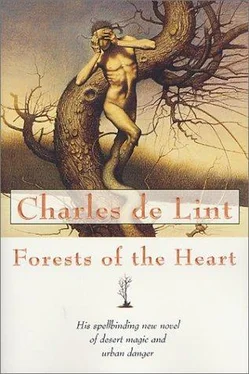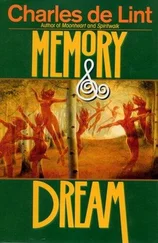Hunter did, where most people wouldn’t, but while he loved music, he liked to think he wasn’t that obsessed by it. And neither were his other employees. Fiona Hale, the store’s part-timer and resident Goth, all tall and pale, with lanky black hair and a chiaroscuro wardrobe, might love her Bead Can Bance and Cocteau Twins CBs, but she had a life beyond them. And as for Miki, well, she was Miki, and who could figure her out. She looked like a punk, played button accordion in a local Celtic band, and when it was her turn to choose what they’d play on the store’s sound system, inevitably picked something by an old horn player like Bird, Coltrane, or Cannonball Adderly. Her musical enthusiasms were great, but then she had the same broad enthusiasm for anything that interested her. Sometimes it seemed that everything did.
“So Adam said you’re going to let his band play in the store some Saturday,” Miki said.
Hunter nodded. “Have you heard them? I’ve got this awful feeling I’m going to regret this.”
“They’re okay—kind of lounge music set to a reggae beat. Imagine The Girl from Ipanema’ sung by Peter Tosh.”
Hunter winced.
“No, really,” Miki assured him. “It’s fun. Except their horns are all sampled and that sucks.” She cocked her head to look at him. “How come you’ve never had my band in to play?”
“You never asked.”
“Adam says you offered them the gig.”
“Adam’s just trying to get a rise out of you.”
Miki nodded slowly. “And wouldn’t you know… it worked.”
They fell silent, listening to the CB. Casey was singing now about a hare hunt in the low country of Creggan.
“So do you want to play here some Saturday?” Hunter asked when the song ended with a fade-out of a flute playing against the lilting rhythm of a bodhran.
“Nah. I wouldn’t want to mix my store and band groupies. That’d be just too weird.”
Hunter had to laugh. Both Miki and Fiona acquired small clusters of teenage boys and young businessmen on a regular basis, earnestly hovering around them in the store, buying their recommendations while working up the nerve to ask for a date. Fiona’s were rather predictably Goth, but with Miki, anything seemed to go, from skateboarders and headbangers to lawyers in three-piece suits.
“There, you see?” Miki said. “If you can still find something to smile about, your life’s not over yet.”
“What do you do when you’re depressed?” he asked.
Miki took a sip from her coffee. “Well,” she drawled, “sometimes I do like in that Pam Tillis song and ask myself, ‘What would Elvis do?’ ”
“And the rest of the time?”
“I imagine what it’s like to be somebody else who doesn’t have my problems. ’Course the downside of that is I have too good an imagination and end up obsessing over what I think could be depressing them. So we’re talking way moody and not really a solution that works or anything.”
“I never think of you as moody.”
“I’m not—except when I’m in that kind of mood.” She grinned. “Mostly I just play some tunes on my box and have a drink with a friend—at the same time, if I can arrange it. Works wonders.”
“I think I’d need a whole orchestra and brewery, and even then I’m not so sure it would help.”
Miki shook her head. “It’s not the volume or quantity—it’s the quality. And it’s the being with a friend that helps the most.”
“That makes sense.”
“So instead of going home and brooding over Ria and store invoices after work, why don’t you come out with me and have a little fun? There’s a session at The Harp tonight, Caffrey’s on tap, a lovely bottle of Jameson’s behind the bar, bangers and mash on the grill.”
Hunter started to shake his head. The last thing he needed right now was a pity date. But then he realized that wasn’t what Miki was offering. She was just being there as a friend.
“Sure,” he said. “Why not?”
Who knows? Maybe he’d actually feel better.
“Cool.”
On the CD player, Casey was now singing a Yeats poem that someone had set to music. The front door opened and three customers came in, brushing snow off their coats and stamping their feet. The mat at the door was going to be soaked before the end of the day.
“Must be noon,” Miki said.
She slid off her stool and walked out from behind the counter to see if she could give anyone a hand and all three men aimed themselves in her direction. Shaking his head, Hunter started to clear off the counter. When two more customers came in, one of them asking what was playing, he took the Casey CD off, made a mental note to order more copies, and put on something that they actually had in stock—a reissue of recordings Stan Getz had made for Verve back in the fifties.
Miki looked up from the worldbeat bins where she was talking up a recording by Violaine Corradi and gave him a thumbs-up.
Ellie made herself wait until she was well and truly awake before going over to the part of her loft that served as her studio. She sat at her kitchen table with a mug of coffee and had a bowl of granola while flipping through an old issue of Utne Reader that someone had passed along to her.
This issue’s cover story was “Wild at Heart: How Pets Make Us Human.” It made her wish, and not for the first time, that she had the sort of lifestyle that could accommodate a pet. The trouble was, she wasn’t a cat person, and a dog needed way more attention than she would be able to give it at this point in her life. Between her work with Angel, private commissions, and the part-time graphic design work she did for the weekly arts paper In the City, she was already scrambling to find time for her own art, never mind take care of anything as dependent as a pup as well.
But one day…
She closed the magazine. Sometimes it felt as though her whole life revolved around things that might come into it one day instead of what was in it now.
Putting her dirty bowl in the sink, she poured herself another cup of coffee and walked across the room to where her current work-in-progress stood under a damp cloth. The sculpture was far enough under way that she could see a hint of the bust’s features under the cloth—brow, cheekbones, nose, the rest lost in the drapes of the fabric. Viewing it like this, a vague, ghostly shape of a face under cloth, supported only by the length of broomstick she was using as an armature pole, it was hard, sometimes, to remember the weight of one of these busts. She could almost imagine it was floating there above the modeling stand, that it would take no more than a slight breeze to start it drifting away across the room.
The illusion only lasted until she removed the cloth and laid it aside. Now the still roughly sculpted head of gray clay was all density and weight, embracing gravity, and the wonder was that the armature pole could support it at all.
It was barely noon, though you wouldn’t know it from how dark it was in the loft. The storm outside made it feel more like late afternoon and she had to put on a couple of lights to see properly. She pulled up a stool to the modeling stand, but before she could begin to work, the sound of the wind rattling a loose strip of metal on her fire escape distracted her, drawing her gaze to the window. She shook her head as she looked outside. The thaw over Christmas had lulled everyone into thinking that they were in for a mild winter for a change, but true to form, it had only been a joke. At least it wasn’t freezing rain.
The fall of the snow was mesmerizing. She’d always wanted to find a way to capture its delicacy in clay, the drift and spin of the individual flakes as they fell, the random patterns they made, their flickering dance and the ever-changing contrast between light and dark, all conveniently framed by the window. But it was something she had to leave to the painters. The closest she’d ever come was an installation she’d done for a group show once where the viewer peered into a large, black box she’d constructed to see confetti being blown about by a strategic placement of a couple of small, battery-driven fans.
Читать дальше












